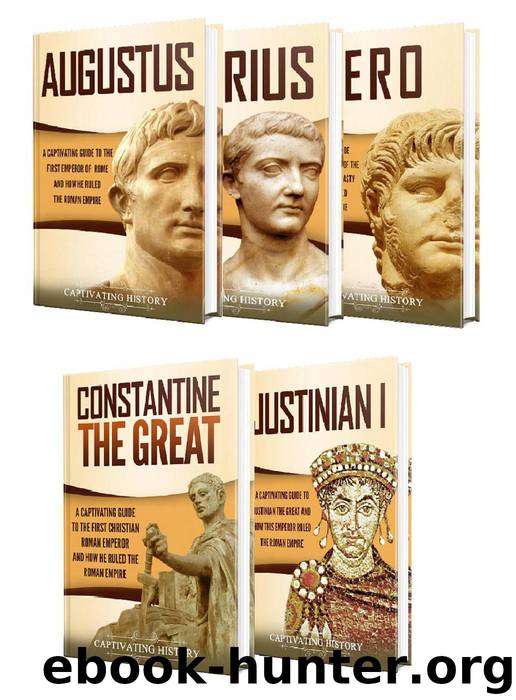Roman Emperors: A Captivating Guide to Augustus, Tiberius, Nero, Constantine the Great, and Justinian I by Captivating History

Author:Captivating History
Language: eng
Format: epub
Publisher: Captivating History
Published: 2020-03-25T16:00:00+00:00
Chapter 6 – Rome Ablaze
Illustration II: An artist's impression of the Great Fire of Rome by Hubert Robert
It was mid-July 64 CE, and all of Rome was afire.
The hot, dry summer winds fanned the blaze, which had started near the Circus Maxima, where the chariot races were held. Yellow flames were whipped wild by the wind, and they jumped in ravaging tongues from one building to the next, reducing homes and businesses to mere soot and ash. Rome was the greatest city in the world, but it was also the world’s greatest slum, and much of the city consisted of the poor plebeians’ humble little homes. These homes were made of wood and were crowded close together. In other words, they were tinder to the roaring blaze. It rushed through the city, coughing a gigantic plume of blackened smoke over its seven hills, and leaving destruction in its wake.
The fire moved so fast that it could neither be contained nor avoided. Efforts to evacuate the people were often fruitless; the very old, the very young, the weak, and the sick simply couldn’t outrun the blaze. It engulfed them, swallowing them whole and melting the living—in a few minutes of horrible agony—into scorched corpses that were barely recognizable as anything that could have once walked and talked. Courageous officials and commoners strove to staunch the blaze, but it was like trying to stop a tidal wave or the coming of winter. It was more than a fire: it was a force, a mighty and unstoppable cascade of heat and destruction, and there was nothing that they could do.
For six long days, starting on the night of July 18th, 64 CE, Rome burned. And it burned, and it burned. And while it burned, Nero, the emperor of Rome, stood upon a rooftop and sang from a classic Greek tragedy about the desolation of Troy. The flames and smoke brought terror to his people. To him, though, they were the perfect backdrop for this dramatic piece of music, and his beautiful voice rose arrogant and thoughtless above the sounds of a dying city. The expression that “Nero fiddled while Rome burned” is inaccurate in its details, considering that stringed instruments wouldn't come to Rome for several hundred years, but its essence was likely to be true.
Desperately, the city officials eventually managed to make some headway against the blaze by destroying a large section of homes in a last bid to make a firebreak. Their attempt was not entirely successful, but it did at least slow the fire down for long enough. After one more day of continual struggle, the fire was finally put out.
The damage was already done, though. Almost two-thirds of Rome, once so vibrant and bustling, had been reduced to a wasteland of smoking ash. As much as ninety percent of its homes were destroyed. Food, shelter, water, infrastructure—it had all been swallowed up in the flames. It is unknown exactly how many casualties there were, but one can only imagine that in a city of several million, it must have been many.
Download
This site does not store any files on its server. We only index and link to content provided by other sites. Please contact the content providers to delete copyright contents if any and email us, we'll remove relevant links or contents immediately.
| Africa | Americas |
| Arctic & Antarctica | Asia |
| Australia & Oceania | Europe |
| Middle East | Russia |
| United States | World |
| Ancient Civilizations | Military |
| Historical Study & Educational Resources |
The Mysteries of Mithra by Cumont Franz(1353)
The Fall of Carthage by Adrian Goldsworthy(1318)
Sacred Britannia: The Gods and Rituals of Roman Britain by Aldhouse-Green Miranda(1153)
Letters from a Stoic (Classics) by Seneca(1038)
Selected Political Speeches by Marcus Tullius Cicero(987)
The Ghosts of Cannae: Hannibal and the Darkest Hour of the Roman Republic by Robert L. O'Connell(983)
The Satyricon by Petronius(980)
Fall of the Roman Republic (Penguin Classics) by Plutarch(973)
The Poison King: The Life and Legend of Mithradates, Rome's Deadliest Enemy by Adrienne Mayor(962)
Rome's Gothic Wars: From the Third Century to Alaric by Michael Kulikowski(948)
Rubicon: The Triumph and Tragedy of the Roman Republic by Tom Holland(945)
Hadrian and the Triumph of Rome by Everitt Anthony(894)
In Defence of the Republic by Cicero(874)
The Roman History by Cassius Dio(872)
Delphi Complete Works of Cicero by Cicero(826)
Letters from a Stoic by Seneca(817)
The Spartacus War by Strauss Barry(801)
Marcus Aurelius by John Sellars(796)
The Twelve Caesars (Penguin Classics) by Suetonius & Robert Graves(777)
